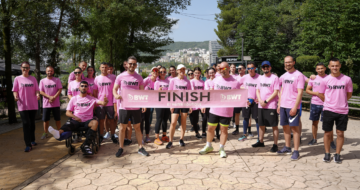UGent and AquaFlanders launch academic chair for sustainable drinking water

Ghent University and AquaFlanders, the sector federation of Flemish water and sewage companies, launched the academic chair for sustainable drinking water. The aim is to join forces in order to conduct research into how the sustainability and quality of our drinking water can be guaranteed into the future.
Ghent University and AquaFlanders, the sector federation of Flemish water and sewage companies, launched the academic chair for sustainable drinking water. The aim is to join forces in order to conduct research into how the sustainability and quality of our drinking water can be guaranteed into the future.
Ghent University and AquaFlanders, the sector federation of Flemish water and sewage companies, launched the academic chair for sustainable drinking water. The aim is to join forces in order to conduct research into how the sustainability and quality of our drinking water can be guaranteed into the future.
Climate change and the resulting periods of drought and intense rainfall are putting pressure on the water supply in Flanders. In order to increase the knowledge about drinking water and to motivate citizens to use more tap water as drinking water, UGent and AquaFlanders founded the chair for sustainable drinking water.
In the first place, the aim is to improve the knowledge of tap water, both in terms of quality, odor and taste, and to conduct research to further reduce the use of chemicals, such as chlorine. In addition, the microbial composition and biostability of the water will also be examined closely, as will the use of materials. However, the intention is to eventually open up the collaboration to address other issues such as climate change and the resulting periods of drought.
The supervisor of the chair will be Nico Boon, professor of Bioengineering. He will be assisted by co-supervisors Professor Elena Torfs (mathematical modeling) and Prof. Dr. Bart De Gusseme (water technologist). The collaboration between UGent and AquaFlanders runs initially until 2025.
Latest insights & stories

A Global Movement: The World Unites in a Pink Pledge for Clean and Sustainable Water
5,000 participants. 32 countries. €30,000 funds raised. And that's just the beginning.
Picture this: One step that sends ripples across the globe, transforming lives and creating waves of change. You might wonder, how can such a simple action for most of us have such a profound impact?

Sustainability and circularity in construction
Join us in transforming the future of construction, creating buildings that not only stand the test of time but also contribute to a healthier planet!

RainTunes: Shower scenarios for the soul
Light, hearing, smell, and touch: Together with experts, we have developed sensuous scenarios that turn showering into an individual experience. Whether you want to prepare for the day ahead or relax after working out. Whether you want to refresh after a day’s work or unwind at the end of the evening: RainTunes surprises with multisensory experiences.*
*Currently available only in Germany and Austria.